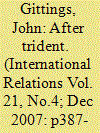| Srl | Item |
| 1 |
ID:
079898


|
|
|
|
|
| Publication |
2007.
|
| Summary/Abstract |
The British government decision on `Trident renewal' forms part of a much wider rebuff to the non-proliferation and peace agenda. The Nuclear Non-Proliferation Treaty risks being discredited at its next review in 2010; new nuclear powers are setting the pace for others; another `war' is being threatened which will last `for generations'. There has been no post-Cold War peace dividend, and the chance to make up for lost time has been missed. War, not peace, is once again seen as the universal default mode.
It is now clear that traditional arguments in favour of peace and nuclear disarmament are never going to succeed. The view that one `cannot predict the unpredictable', used to justify the Trident decision, will always result in decisions being reached on a worst-case scenario. New arguments need to be developed with a broader appeal based not only on strategic calculation but on a compelling alternative world view.
Looking both forward and back into history we have to rediscover peace, not war, as humanity's central concern. Just as the test of the good ruler in ancient China was to maintain peace within the four corners of the kingdom, so today modern states have a shared obligation to exercise good governance across the globe. The effort to reshape our common goals will require a sustained exercise in the re-education of elites, and the mobilisation of multitudes
|
|
|
|
|
|
|
|
|
|
|
|
|
|
|
|
| 2 |
ID:
167196


|
|
|
|
|
| Summary/Abstract |
One hundred years ago, the first Department of International Politics was established at the University College of Wales, Aberystwyth, with the express purpose of seeking in Arnold Toynbee’s prophetic words (uttered many years later) – of breaking decisively with the ‘habit of nationalism’. As David Davies in the founding statement put it, by moving beyond ‘insular and vested prejudices … the shattered family of nations’ could be brought back together again and a new world order established. Yet as the history of the twentieth century showed – and the new century looks to be no nearer to realizing that original dream – nationalism has throughout continued to retain its power of mobilizing peoples and setting nation against nation. How and why this happened and with what consequences is the subject of this article.
|
|
|
|
|
|
|
|
|
|
|
|
|
|
|
|